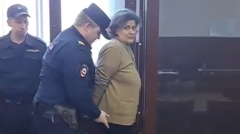A St. Petersburg hairdresser, Anna Alexandrova, has been sentenced to over five years in prison for allegedly spreading "fake news" about the Russian army through anti-war social media posts. Her case, emerging from a neighborhood dispute, underscores the Kremlin's severe restrictions on free speech and dissent since the invasion of Ukraine.
St. Petersburg Hairdresser Sentenced to Jail for Anti-War Social Media Posts

St. Petersburg Hairdresser Sentenced to Jail for Anti-War Social Media Posts
Anna Alexandrova's conviction highlights Russia's intensified crackdown on dissent amid the ongoing conflict in Ukraine.
A St. Petersburg hairdresser has been dealt a five-year and two-month prison sentence for allegedly spreading fake news about the Russian military via social media platforms. Anna Alexandrova, 47, who is a mother of two, fiercely denies the accusations and claims that her conviction stems from a neighborhood dispute over land.
The case against Alexandrova arose after she was accused of sending her neighbor's daughter images related to the war in Ukraine. This led to the neighbor lodging a complaint with the authorities. The law criminalizing the discrediting of the army was enacted shortly after the February 2022 invasion of Ukraine, as part of a broader crackdown on dissent that has seen numerous activists and independent journalists jailed.
Just days prior, four journalists faced similar fates, receiving five and a half-year sentences for their involvement with an organization deemed extremist by the Kremlin. Their alleged crimes revolved around producing critical journalism about corruption linked to major political figures, including opposition leader Alexei Navalny, who was found dead in prison the previous year.
Arrests of individuals from various professions under these stringent laws have become rampant, stirring memories of the Soviet era when mistrust and denunciation were commonplace. Alexandrova's case began as a personal disagreement over local development issues. Once one party involved turned to authorities, the narrative shifted dramatically when the fake news charge emerged.
Despite her insistence on not sending anti-war images, the court's ruling was seemingly dictated by a broader agenda targeting dissenters. Alexandrova has also been barred from sharing any additional posts on social media for the next three years.
Meanwhile, Alexei Gorinov, a Moscow council member who publicly criticized the invasion, is appealing his lengthy prison sentence, claiming that laws designed to battle misinformation stifle legitimate criticism and dissent. His legal representatives contend that such legislation is used to quash anti-war sentiments and narratives that oppose the government’s official stance.
As the war endures, the Russian state continues to reinforce its grip on free expression, prompting global concern over the erosion of civil liberties in the country.


















